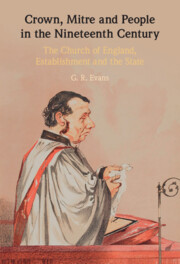 Crown, Mitre and People in the Nineteenth Century
Crown, Mitre and People in the Nineteenth Century Published online by Cambridge University Press: 14 September 2021
This chapter discusses a series of high-profile cases in which significant disputes arose involving the application of ecclesiastical law. It begins with Parliament’s debates on its role and authority in this area as it attempted more than once to frame legislation for clergy discipline and the discussions in Convocation. It considers the Gompertz case, raising questions about the role of the bishop; the contrasting churchmanships of Evangelicals and Tractarians; and the controversy about biblical interpretation prompted by the publication of Essays and Reviews. The case of James Shore tested the law on the effect of a clergyman’s finding his opinions had changed to such an extent that he was no longer a member of the Church of England, while still effectively retaining his Anglican priesthood. The chapter also covers the cases of William Bennett and the ‘real presence’, and George Denison’s lengthy dispute with the Bishop of Exeter on the effect of baptism. It ends with the case of Alexander Mackonochie and controversy over the regulation of public worship.
To save this book to your Kindle, first ensure [email protected] is added to your Approved Personal Document E-mail List under your Personal Document Settings on the Manage Your Content and Devices page of your Amazon account. Then enter the ‘name’ part of your Kindle email address below. Find out more about saving to your Kindle.
Note you can select to save to either the @free.kindle.com or @kindle.com variations. ‘@free.kindle.com’ emails are free but can only be saved to your device when it is connected to wi-fi. ‘@kindle.com’ emails can be delivered even when you are not connected to wi-fi, but note that service fees apply.
Find out more about the Kindle Personal Document Service.
To save content items to your account, please confirm that you agree to abide by our usage policies. If this is the first time you use this feature, you will be asked to authorise Cambridge Core to connect with your account. Find out more about saving content to Dropbox.
To save content items to your account, please confirm that you agree to abide by our usage policies. If this is the first time you use this feature, you will be asked to authorise Cambridge Core to connect with your account. Find out more about saving content to Google Drive.